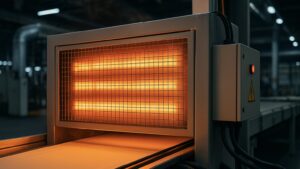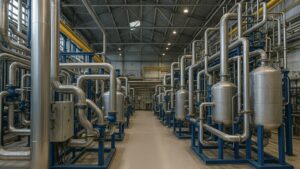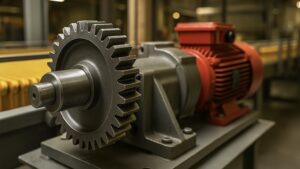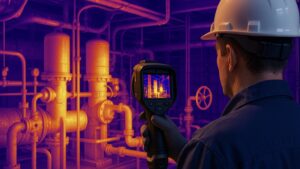- Automation
AI and automation can also be used outside of metering and measuring. An energy management system (EMS) can process the energy use of all facility machinery simultaneously. It can calculate what rate certain machinery should work at and adjust it to output needs. EMS can also manage the facilities grid. Should a generating station disconnect, it can select the most energy-efficient way to reintroduce power. Imagine an operator using a higher-energy setting on a machine for a one-time event. Should the operator not revert the setting, the machine could be using more energy than necessary in all subsequent shifts. An automated system could quickly locate and rectify this human error.
- Understand how your facility uses energy
To establish an energy management plan for your company, you first need to understand how your facilities consume electricity. Most buildings already have metering points, which collect data about consumption, but it is vital to combine this data. If necessary, hire an energy expert to make sense of this information. Fans, pumps, and refrigerators are commonly the main sources of energy consumption. But to what extent? By understanding how a facility operates, you can create an energy management plan. Long-term metering can have cumulative benefits as different seasons have different requirements. Modern monitoring systems help businesses keep track of consumption and predict future energy use.
- More modern refrigeration
It’s important to keep food products cool. In fact, it’s the job of refrigeration systems. Refrigeration units are a major energy consumption point for the food industry—some studies put the percentage as high as 70%. Modern refrigeration units tend to be more energy-efficient than older ones, so an assessment of current equipment may be necessary. Variable speed drives (VSDs) can be installed to cut energy use without sacrificing output. VSDs adjust how the machine runs; they can cut back on compressor capacity when necessary or throttle down pump speed when the correct temperature has been reached. Case studies have shown that VSD HVAC systems can save up to 50% on energy costs by adjusting cooling performance with thermodynamics controls. It should be noted that some VSD systems can be integrated with AI to further increase efficiency.
- Renewable energy efficiency
Energy prices are rising, and it’s possible they will continue to rise in the near future. It’s best to explore generating your own energy now so that you can keep costs from fluctuating. The longer you wait, the more expensive it may be to implement renewable energy in the future. Sunny areas are great for building solar panels, but other areas may benefit from using wind power. Certain industries already use renewable energy to help keep their costs stable and manageable. For example, the Gudai-Darri mine in Australia produces 65% of its energy with solar panels. This has offset the mine’s CO2 emissions by 90,000tpa (tons per year). Glencore’s Raglan mine in Canada utilizes wind energy in conjunction with a flywheel to store power for calmer days. This helps the operation cut emissions by 12,000 tonnes of CO2 that would otherwise be released from a diesel-operated mine. The food industry also has pioneers in the field of green energy: S Foods Singapore uses solar energy solutions as its main source of power for its Singapore facilities.
- Reduce food waste
A significant portion of the food produced for human consumption gets thrown away. This wasted food consumes energy in its production and adds to carbon dioxide emissions. Companies should investigate where in the production process is the majority of food lost. VSD systems have the potential to help, as they can regulate production speeds to match requirements and storage capacities.
Where should companies start?
The food and beverage industry can save money by reducing energy consumption and cutting CO2 emissions. Food production accounts for up to 30 percent of the world’s energy use, and companies should make a holistic assessment of where new technology can be implemented. Industry peers are a valuable source of information because learning from the experiences and mistakes of others is cheaper than making those same mistakes yourself. Pitfalls to be avoided, case studies, and best practices should all be analyzed to make an informed energy management plan.
Companies need to learn from their peers who have embraced this technology. The Net Zero Food & Beverage Forum: Energy Efficiency and Decarbonisation conference, held from the 16th to 17th of February is an ideal opportunity. Industry leaders and innovators will gather in Berlin to discuss and exchange ideas and experiences with managing energy consumption. Visit future-bridge.eu or follow us on our social media to keep track of other events about energy use and decarbonisation.





